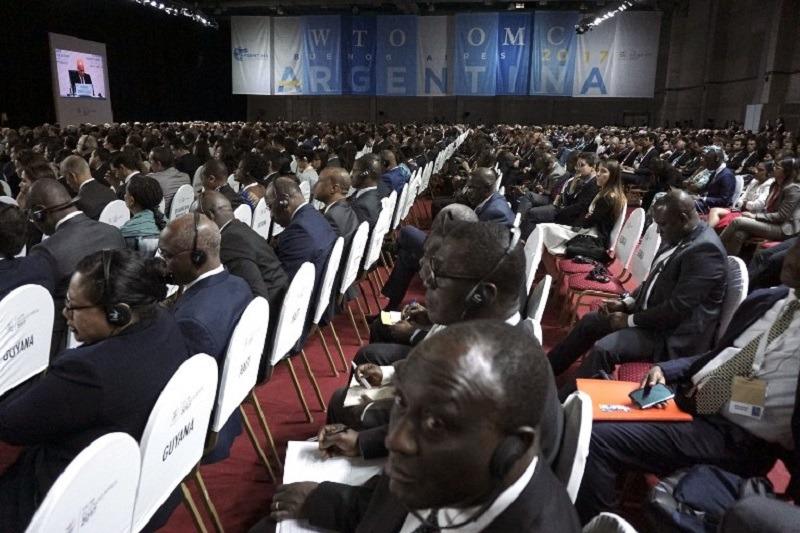
Financial Times writes, "...The US, EU and Japan last week ramped up pressure on China on trade, subsidies and intellectual property issues. In a rare effort towards international co-operation by the Trump administration, the three issued a statement on the sidelines of a World Trade Organization meeting in Buenos Aires last week that took aim at "severe excess capacity" in steel and other sectors and the role of illegal subsidies and state-owned enterprises in causing it. The statement, which also targeted the forced transfer of intellectual property, did not name China directly. But officials have made clear that China is the statement's main target, though not the only one. The intention behind the trilateral alliance is to avert a lurch towards protectionism by wringing concessions from Beijing...But from a broader perspective, such mounting tensions represent an existential test for the global trading system. At issue is whether China's state-driven, hybrid system has become so divergent from free-market principles that fruitful co-operation is precluded... The US and EU argue that illegal subsidies, state financing and favourable policies toward state-owned enterprises have contributed to industrial overcapacity that is flooding world markets with cheap steel, aluminium and other commodities. Such accusations may be justified. But this does not make the success of the trilateral approach to China any more likely. The issues that the US, EU and Japan identified are fused into the nature of Beijing's party state. They are expressions of a political economy that China has no intention of rolling back.
Reuters reported that President Donald Trump will lay out a new U.S. national security strategy on Monday based on his "America First" policy and will, among other items, make clear that China is a competitor, two senior U.S. officials said on Saturday. Trump has praised Chinese President Xi Jinping while also demanding that Beijing increase pressure on North Korea over its nuclear program and to change trade practices to make them more favorable to the United States. The national security strategy, to be rolled out in a speech by Trump, should not be seen as an attempt to contain China but rather to offer a clear-eyed look at the challenges China poses, said the officials, who spoke on condition of anonymity. The strategy, which was still being drafted, may also reverse Democratic President Barack Obama's declaration in September 2016 that climate change is a threat to security, one official said. Trump, a Republican, is to lay out his foreign policy priorities, and will emphasize his commitment to "America First" policies such as building up the U.S. military, confronting Islamist militants and realigning trade relationships to make the United States more competitive, the officials said.
- 2017-12-15 China Is Still Building on Disputed Islands in the South China Sea
- 2017-12-14 China’s ‘long arm’ of influence stretches ever further
- 2017-12-13 Tillerson's new North Korea strategy praised by China and Russia — but undermined by Trump
- 2017-12-12 Why China Won't Cut Off North Korea’s Oil Lifeline
- 2017-12-11 China volatility darkens 2018 investment outlook
- 2017-12-10 Once the WTO's Biggest Supporter, US Is Its Biggest Skeptic
- 2017-12-08 China’s commodity demand picks up in November
- 2017-12-07 China criticizes India over drone crash inside border
- 2017-12-06 No. 3 Person of the Year 2017: Xi Jinping
- 2017-12-05 U.S. trade gap soars as imports from China hit record high
- Reuters China insurance regulator to curb business of low-rated insurers: Xinhua
- Bloomberg China Should Open Financial Sector More, UK's McGuinness Says
- The Washington Post The Latest: Prayer, praise open San Francisco mayor memorial
- Bloomberg Vietnam Follows Beijing With South China Sea Upgrades of Its Own
- Forbes Ford's Deal To Sell Cars Direct In China With Allibaba Could Transform Auto Purchases
- RT News 'Most important relations': How US pressure may help turn China-Russia strategic ties into alliance
- The Washington Post How China got a US senator to do its political bidding
- The Washington Post 'Celebration of life' for San Francisco mayor who died at 65
- www.nbcnews.com At a wartime memorial, a push for China-Japan reconciliation
- www.newsweek.com North Korea Neighbors Russia and China Carry Out High Tech Anti-Missile Drill in Beijing
- Reuters China to reform collective assets in countryside-media
- Reuters Chinese military transport plane flies near Taiwan
- Wall Street Journal The Fast and the Financed: China's Well-Funded Auto Startups Race to Overtake Tesla
- Reuters Second prototype of China's C919 jet conducts test flight: state TV
- Reuters China unveils 2017-2021 winter clean heating plan: media
